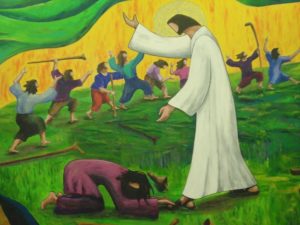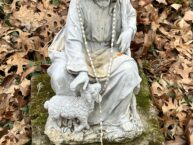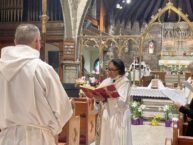 October 13, 2019: May God’s words alone be spoken, may God’s words alone be heard. Amen.
October 13, 2019: May God’s words alone be spoken, may God’s words alone be heard. Amen.
Oh how I love the story we heard today in our Hebrew scripture lesson from 2 Kings about Naaman, the commander of the army of the King of Aram. It is one of the best narratives, and if you want to hear more about it, go to our website and take a look at the sermon from July 3, 2016 titled “From Night – To Dawn – To Day.” (link below). We will hear a bit more about this today, but not a deep dive, because in this time and place, I want to focus mostly on the gospel reading about Jesus and the 10 lepers.
So, to recap here, Jesus and his gang are still traveling toward Jerusalem, and according to the author, they are now in the area between Samaria and Galilee. When they enter a village, ten lepers approach only close enough to be heard, begging Jesus for mercy. He tells them “go and show yourselves to the priests.” They do, and on the way they find they are healed of their leprosy. Nine continue on to do as they were told, but one does not. He turns around to thank Jesus first. This one was a Samaritan. Then Jesus, wondering where the other nine were, asked, “I may be bad at math, but weren’t there 10 of you guys?” Now, before we go any further, a couple of things are important to get clear at the start.
First, the other nine did nothing wrong. In fact, they did what Jesus told them to do – the very red letter words of Jesus, not to mention following the law as written in Torah, or what Christians call the Hebrew scriptures. They marched right over to the priests to present themselves for inspection that they might be welcome back into the temple. So, all good, right?
Second, while this is not a commentary on Levitical laws or the culture of the time, there is a reason this is a healing of lepers, as anyone with a visible skin disease would be unable to enter the temple, and would also be social outcasts. So the point here isn’t a commentary about temple purity laws, as even Jesus, being a good Jew, understands how this all works. It is about people on the margins.
And that brings us to the third thing. Where Jesus is said to be at the moment didn’t really exist. There is no area between Samaria and Galilee, because they bordered one another. So, unless the author of Luke & Acts (and most of you know by now it is the same person) is somebody who should never say “I’ll take Geography for $200 Alex”, this isn’t meant to be about a physical place.
Here’s the thing about these two texts today – the one in 2 Kings, and the gospel – they have a lot to teach us now.
Because at a time when we have turned our backs on the Kurds in Northern Syria, allowing them – men, women, and children and their homes – to be bombed by Turkish forces, we hear about Naaman, commander of the armies of the King of Aram. Aram – a country we now call Syria. And this Syrian commander was healed by God’s anointed, the prophet Elisha, who, by the way, just happened to be in Samaria…the land of those foreigners of the gospel – the Samaritans.
And speaking of foreigners like the Samaritans, at a time when our government rejects, imprisons, endangers, and leaves to die men, women, and children on our Southern border because they are “foreigners,” we hear about the Samaritan who along with nine others, was healed by the son of God because Jesus saw them, heard their cries for help, and responded.
At a time when LGBT people are pleading for our Supreme Court to see their distress, and free them from the bondage of discrimination, we hear about people who live on the margins, live in the borderlands, hoping someone will notice them, someone will care. And Jesus did.
But the gospel is also asking us to go further, to live as though we always see God’s work in and around us. How do we do that when all around us the world seems to be imploding with anger, hate, bitterness, and violence? The answer lies in that 10th Leper…oh heck, let’s give the poor guy a name. Let’s call him Larry. Larry the leper.
Larry, seeing that he is healed, returns to give God thanks. To thank Jesus. And in that moment, Jesus does something we sometimes miss in this story. Jesus heals him again. Jesus, the text says, after lamenting that the others did not also return, tells Larry “Get up and go on your way; your faith has made you well.” But wasn’t he already healed? Yes, physically. But the Greek word used here can be thought of more as being made whole. To understand this more, it is important to remember again that this land between Samaria and Galilee in which Jesus is supposed to be traveling isn’t an actual place. This borderland, for the author of Luke, was meant to be a theological one.
What was different about Larry, and why did his return make him whole? It wasn’t what country he came from or what Torah tradition he followed, it was that for him, faith was about seeing and responding to the God at work in our lives in a different way, and being grateful for what has been, what is, and what may be. The first healing was a physical one, but his faith, a faith that helped him to recognize blessing in his life – even life on the margins, in the borderlands – and respond with gratitude – that faith has healed him at a far deeper level. That faith has healed him spiritually and emotionally. That faith has made him whole.
And so we are being asked to consider as well how we live in relationship with God, how we respond to things that happen in our lives, and the impact all of it has on us, and on the world.
I want to tell you about someone you all know well. When I first came here, even before I was called as your Rector, I met Pearl Anderson. In her younger days, along with her bud Betty Yarborough and a few others, she was quite a force of nature – deeply faithful, wildly fun, and not one to allow anyone to be pushed aside, most especially herself, or those she loved – still true today too. When I first met her, and still today, she struggles to get around using her walker, but if you ask her how she is, she always will say “I’m blessed.” Always. Every single time, every single day – no matter how much pain she is in, or what is happening in her life – every time.
Now most of you know that Pearl had a stroke a few weeks ago, and is recuperating, getting a bit better each day. When I visited Pearl in the hospital a few weeks ago, I didn’t see anything other than the same smiling, faithful, Pearl I had come to know. She couldn’t say in words “I am blessed,” but she didn’t have to. I could see it in her eyes, in the way she held my hand, in the way she tried to say the Lord’s prayer with me. Her faith, her gratitude, has made her whole, and has healed in many ways those who are blessed to know her.
I remember someone, no longer here at the church, but a good person who loved Pearl dearly. Anyway, she used to say that it made her so mad when Pearl would say that, “I’m blessed,” because, as this person surmised, it was just not possible to always feel blessed. “Why can’t she just be honest about it,” this person would say. But the thing is, I think Pearl looks at life differently. I think Pearl and Larry have a lot in common.
Now, last week I said that faith is a choice. It is. And how we live it is a choice too. Gratitude is one of those choices – one that both Pearl and Larry the Leper make. One commentator called it a “counter-cultural witness,” and I whole heartedly agree. Just turn on the news, or scroll through your Facebook or Twitter feed, and gratitude is not really the first thing that jumps out at you is it. While righteous anger about injustice, and Lordy if there isn’t enough of that going around, is important, our national discourse has deteriorated to a cesspool of intolerance, bigotry, anger, and hate. Imagine the impact of changing the tone to one of gratitude. What might that look like? What might that do? I can say this – it may not change the person on the other end of the twitter rant, but it will change you.
Imagine too a world where we are grateful every single day for even the tiniest of blessings. For things like the colors of fall leaves, the way a crocus will pop up amidst a blanket of snow, for a baby’s smile, or a full moon in a clear night sky. Imagine that, because when we can be grateful for the small things, it will change us. It won’t mean that life will be easy, or all our problems will disappear. There is not a doubt in my mind that Pearl, or for that matter any of the rest of us, have lives that are all sunshine and roses. That isn’t life at all, but some sort of utopian fantasy.
Yet choosing to be grateful isn’t about everything being perfect. It is about being able to see God in the imperfect reality, and respond with gratitude. That will make a difference, in our lives, and in the lives of those around us. Pearl may struggle on any given day, but for most of those who encounter her, they cannot help to reconsider their own outlook when they hear her look up from her walker and say “I am blessed.”
To be sure, there are times in our lives when we are in dark places – we’ve lost someone we love, we have no home, lost our job, are weary with disease, feel the yoke of oppression on our necks, or the sting of bigotry on our hearts. And in those times, gratitude may seem more something to be hoped for than a reality, and that’s okay. Because this isn’t something we must take on as doctrine, that would defeat the entire purpose. Rather it is a theological invitation to another way of life, and the more we say yes to it, the easier it will get, even when blessings seem to be nothing more than a far off dream.
And when we accept that invitation, we will be changed. We will see the world differently. It isn’t that we won’t see things as they are – that we won’t behold the brokenness around us. It is just that we will start to notice that amidst the rancor and hate, there are peacemakers too; that standing alongside the oppressed and the marginalized, there are advocates and allies; that in our darkest hour, there are those who hold us in prayer, and a God who loves us deeply. We will notice this because we will be looking for it as part of how we live.
Last week, when I talked about faith being a muscle that needs to be worked, so too with gratitude. Practicing it will strengthen us, and help us to respond to these times in our life in a way that will help restore us to wholeness when we are most broken by the trials of life. In fact, that I believe, is why it is a part of our every Sunday worship experience.
You see, our worship service is called a Eucharist for a reason. Eucharist, is from the ancient Greek εὐχαριστία, meaning thanksgiving or gratitude. When we come here, we practice our faith, and our gratitude. We give thanks for what is, and what may be. And part of how we do that is in the offering, which for us happens when we begin what is called The Great Thanksgiving – when we celebrate the Lord’s supper, and receive the body and blood of Christ. This is no coincidence by the way, because in a very real sense, each week through our gifts to this church, we are the one that came back to Jesus to offer thanks.
Today begins our annual Stewardship Season, and we are learning today that stewardship isn’t about obligation, but about being Larry or Pearl – recognizing how God is working in our lives, and being grateful for it, and for this place, in which we can be renewed and restored. It is making a choice to accept the invitation Christ gives to us. That is what stewardship is all about – living a life of gratitude – a life that makes us whole.
And so as we do in Stewardship Season, you will receive something today – a leaf, which should have been given to you when you came in. If not, an usher will provide one to you. On this leaf, I want you to write one thing for which you are grateful. It doesn’t have to be something grand like being healed of leprosy. It might just be that you are thankful for being able to get out of bed this morning. Whatever it is, write it on this leaf. If you need something to write with, we can provide it, as you will likely need a Sharpie for this one. Do this now, or during The Peace, because this is not a leaf you will take home.
At the offering, place it in the plate along with your weekly contribution. These will later be displayed for us all to take in, for sometimes the way in which we are able to sustain gratitude is to see all the ways others find blessings in the day to day of life.
Then, when you come up for communion, you will receive another leaf, blessed at the altar, to take home with you. When you are having days when it is hard to feel grateful, when life seems to be more than you can bear, when the news seems to drown out all hope – look at this leaf, and remember this place, where you are able to be a part of a parish family that loves you, where you are welcomed unconditionally, where justice is given voice, and where every week you can return, give thanks, and feel the healing of God’s grace. When you look at it, remember too that even though our lives, like the seasons, sometimes move from beautiful joy to winter darkness, one thing will never change – God’s all abiding and unconditional love for you, just for being the wonderful child of God that you are, and that is itself the greatest blessing of all.
And one more thing… the next time someone asks how you are, try responding as Pearl does. Tell them “I’m blessed.” Try that out for a week or two. I have no doubt in my mind that it will change you, change them, and bring about wholeness in the borderlands.
Amen.
Link to the sermon from 2016 on the 2 Kings passage referenced above: https://christchurchepiscopal.org/from-night-to-dawn-to-day/
For the audio from the 10:30am service, click below, or subscribe to our iTunes Sermon Podcast by clicking here:
The Rev. Diana L. Wilcox
Christ Church in Bloomfield & Glen Ridge
October 13, 2019
Pentecost 18 – Year C – Track 2
1st Reading – 2 Kings 5:1-3, 7-15c
Psalm 111
2nd Reading – 2 Timothy 2:8-15
Gospel – Luke 17:11-19






